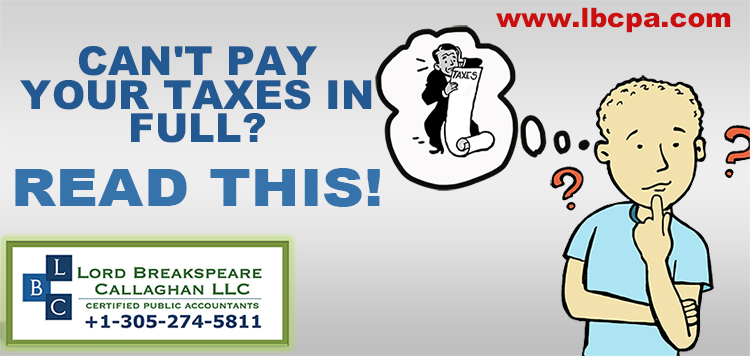LBCPA News 
Click here to go back
Need options for when you owe federal taxes, but can’t pay in full?

The best-case scenario is to pay your taxes in full (Easy Payment Methods explained video) by the due date of the tax return (May 17, 2021 for your 2020 returns), because otherwise both a failure to pay penalty and interest will may continue to be assessed until it is fully paid.
However, due to the lingering effects of COVID-19, many people are facing financial difficulties. So, if you are unable to pay your taxes in full, the IRS has several options that you can consider based on your financial situation.
Here’s a summary of some of the options available and links to get more information and how start the process of making the type of request you choose.
- Payment Plans – the IRS provides a variety of payment plan options, including the ability to apply online for a payment plan. The benefit to applying online is once you complete your online application you will receive immediate notification of whether your payment plan has been approved. Also, if you run into trouble, this option allows you to “chat” online with an IRS assistor to help you finish the process or get other guidance on further options. Setup fees may be higher if you apply for a payment plan by phone, mail, or in-person.
The availability of a payment plan will depend on your income, the amount owed, and how long it will take to pay. In some cases, there are both short-term and long-term options available, again, depending on the amount you owe. The information on this page will tell you all you need to know about payment plans. In some cases, you can set up a payment plan to automatically deduct payments from banking accounts, paychecks or you can make payments electronically or mail-in payments yourself. In most instances, you can also choose your payment date too.
- Fees – Payment agreement fees are required for most long-term plans. However, if you qualify as a low-income taxpayer, you may request a waiver of those fees. Also, depending on the payment method you choose, there may be processing fees charged by the bank or credit card company.
Can’t pay now – If the IRS determines that you cannot pay any of your tax debt at this time, they may report your account as currently not collectible (CNC) and temporarily delay collection until your financial condition improves. Being designated as CNC does not mean the debt goes away, it means the IRS has determined you cannot afford to pay the debt at this time. Prior to approving your request to delay collection, the IRS may ask you to complete a Collection Information Statement (Form 433-F PDF, Form 433-A PDF or Form 433-B PDF and provide proof of your financial status (this may include information about your assets and your monthly income and expenses).
You should know that if the IRS does delay collecting from you, your debt will increase because penalties and interest continue to be charged until you pay the full amount. During a temporary delay, the IRS will again review your ability to pay, generally annually. The IRS may also file a Notice of Federal Tax Lien to protect the government’s interest in your assets.
You should also review our TAS Currently Not Collectible page and video, before you start the process. Also, be sure to file all prior year tax returns (if you were required to file a return), even if you can’t pay the amount you owe on any returns right now, before requesting this option. You can find filing help options on our page above as well.
If the IRS decides you can make some type of payment and you still disagree, you do have options. We recommend reading our TAS Currently Not Collectible page for more information about this.
Offer In Compromise – A Doubt as to Collectability or an Effective Tax Administration offer in compromise (OIC) allows you to settle your tax debt for less than the full amount you owe. It may be a legitimate option if you can’t pay your full tax liability or doing so creates a financial hardship.
The OIC process is not for everyone and generally requires a non-refundable fee, so explore all other payment options before submitting an OIC. If you hire a tax professional to help you file an offer, be sure to check his or her qualifications.
Review our TAS OIC page and video about OICs before you start the process. You can also read “An offer in compromise may help some taxpayers settle their tax bill,” use the IRS Offer in Compromise Pre-Qualifier Tool to see if you may be eligible to make an offer, and the see links in the “Resources” section below, for additional information on OICs.
If you have any questions regarding accounting, domestic taxation, essential business accounting, international taxation, IRS representation, U.S. tax implications of Real Estate transactions or financial statements, please give us a call at 305-274-5811.
Source: TAS






